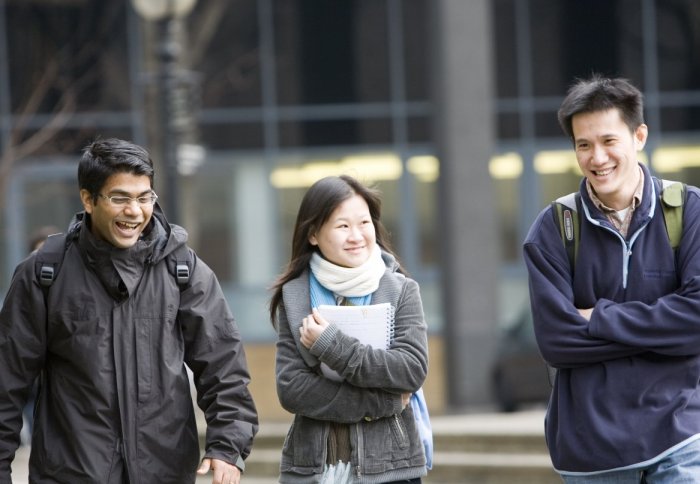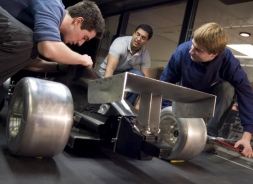Imperial students have their say in National Student Survey

The release of the 2012 National Student Survey results reveals an overall satisfaction rating of 86 percent for Imperial
The release of the 2012 National Student Survey (NSS) results today reveals an overall satisfaction rating of 86 percent for Imperial, one percent higher than the sector average and Imperial’s results in 2011.
Across all the categories in the survey, the College achieved a higher or equal percentage satisfaction compared to previous years, with the largest climb being in Assessment and Feedback, which saw an improvement of 8 percent since last year.
The College scored most highly in the learning resources category, with students’ satisfaction increasing compared to 2011 with access to library services, IT support and specialised equipment, achieving an overall rate of 92 percent against the sector average of 79. Following a campaign led by Imperial College Union to engage students with the Survey the participation rate at the College also increased from 64 percent to 71, among the highest in England and Wales.
NSS data is based on the opinions of participating final year undergraduates across most UK universities and colleges, on a number of issues from personal development support to how intellectually stimulating students find their courses. With other universities also seeing improved results, Imperial fell from 53rd to 67th in the rankings for overall satisfaction.
The NSS data also informs the new Key Information Sets (KIS) which are available from the Unistats website. This information is provided for every undergraduate course across almost all English and Welsh higher education institutions to help prospective students make an informed choice about their course.
Welcoming the NSS results Imperial’s President & Rector Sir Keith O’Nions said: “Today’s results indicate the progress that continues to be made in enhancing what we offer to students at Imperial. Of particular note is the climb in satisfaction rates in the assessment and feedback category, reflecting the focus that many departments have put on clarifying how assessments are made and in offering quality and timely feedback on students’ work. Imperial College Union have also made sterling efforts to boost engagement in the NSS, demonstrated by the increase in the response rate.”
He added: “We cannot however be complacent. Many of our competitors have leapt up in their NSS ratings and we know that there’s more we need to do to make our performance consistently high across the College.”
Imperial College Union President Paul Beaumont said: “The Union is very pleased to see how seriously the College is taking measures to improve the student experience, at all levels. We are working on an update to last year's Union NSS response that will set new targets, building on those proposals; many of which have been implemented or are planned already.”

Students in the Department of Aeronautics
Among a number of departments which saw significant improvements this year was the Department of Aeronautics, with across the board improvements and an increase in overall satisfaction of 18%. The Department of Physics, meanwhile, saw increases across most NSS categories, including a 12% improvement in assessment and feedback.
Staff from the departments share details below of some of the initiatives they are working on to improve the student experience:
Setting the agenda in Aeronautics
Representation of student opinion has featured heavily among the initiatives the Department of Aeronautics has put in place over the past two years. Student departmental representatives now have the opportunity to chair the staff and student committee – allowing them to set the agenda for what issues will be discussed. Representatives now also attend the teaching committee where issues relating to the curriculum and teaching are raised.
Dr Colin Cotter, Senior Tutor in the Department said that an important issue to tackle has been clearly communicating expectations to students. “Some of the issues students have raised include not always being sure of what they are expected to know, and how well they’re doing. As well as ensuring feedback is timely and of a good quality we have implemented a number of steps to ensure things are clear.”
These include setting progress tests so that students have a better sense of how they are doing, together with experience of sitting exams. Lecturers are also encouraged to share a list of learning outcomes at the end of lectures, so students are clear on the essential points they should take away.
The Department is also introducing sections into staff meetings where lecturers present on their courses. Colin said: “Taking this approach ensures that we can share experiences and best practice. Colleagues are exploring quite a few innovative approaches; one in particular has taken to using a tablet to draw out his equations. His lecture and his scribbles are all recorded simultaneously so that students can play back both elements together after the lecture.”
Reflecting on the NSS results Colin added: “Student satisfaction is a really important aim of our Department, and we should always be driven by the need to improve it for this sake alone, rather than being too focused on the NSS. It’s definitely useful but it’s one of a number of measures we should be considering, including internal surveys and more direct student feedback shared via departmental representatives and students’ personal tutors or lecturers.”
Building the community in Physics
The Department of Physics has also been working closely with its students to understand how to better the student experience. As well as improving student feedback processes it is introducing a number of initiatives for the future.
Professor Danny Segal, Senior Tutor, said “We are a very big department and increasing a sense of community both between students and between undergraduates and academic staff is a priority for us.”
One of the initiatives under development is a restructuring of student year groups into groupings of 20 students, with each having specific teaching staff assigned to them for one to two years. The Director of Undergraduate Studies, Professor Angus MacKinnon, who has been leading this change, explained: “As things stand students are grouped as a whole year, or as a small tutorial group. We are hoping that the changes will engender a more effective sense of both community and continuity for students.”
Building on this, the Department is also introducing ‘Research Frontiers’ talks, in which undergraduate students can hear directly from the Department’s leading researchers about what they are working on, with opportunities after each talk for them to mingle with the academics and their research teams.
Article text (excluding photos or graphics) © Imperial College London.
Photos and graphics subject to third party copyright used with permission or © Imperial College London.
Reporter
John-Paul Jones
Communications and Public Affairs